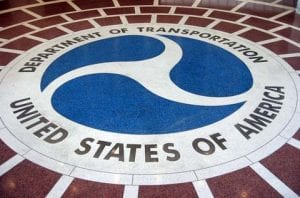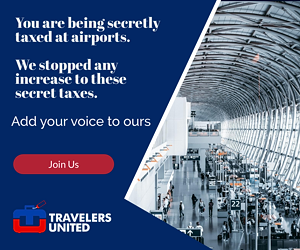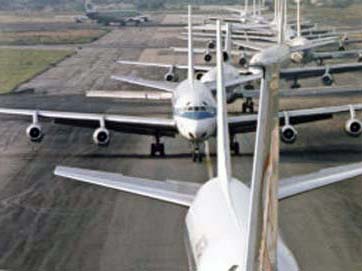In the dark of the night, DOT’s first consumer rule creates a deceptive definition of deceptive
 The day after Thanksgiving on Black Friday the Department of Transportation (DOT) rolled out its only new consumer regulation of the past four years. Surprise! A Department that is supposed to protect consumers does just the opposite by creating a deceptive definition of unfair and deceptive practices. This is a major change. All of DOT consumer protection abilities lie within the realm of unfair and deceptive practices (UDAP).
The day after Thanksgiving on Black Friday the Department of Transportation (DOT) rolled out its only new consumer regulation of the past four years. Surprise! A Department that is supposed to protect consumers does just the opposite by creating a deceptive definition of unfair and deceptive practices. This is a major change. All of DOT consumer protection abilities lie within the realm of unfair and deceptive practices (UDAP).
Travelers United raised three issues that DOT and the White House ignored in jamming through this new deceptive definition. Click here for the final rule.
- Is the new UDAP rule constitutional? Can DOT significantly change the will of Congress and Judicial action by a new rule?
- Is the rule based on today’s pandemic reality and DOT’s lack of enforcement of rules already in place?
- Will this new definition of unfair and deceptive practices result in future litigation about current consumer protections? Will the new definitions allow airlines to take current protections to court, harming consumers?
For consumers, it is deja-vu all over again. For the past eight years, airlines have fought to hobble the regulatory authority of the Department of Transportation (DOT). During an almost-four-year period, no consumer protection rules have been issued. But now, airlines won. They now have an anti-consumer rule that will redefine Unfair and Deceptive Practices (UDAP). The rule was passed despite consumer and legal concerns noted above.
Airlines have lost previous attempts to change UDAP rules.
 Judicial branch losses: Airlines have failed in regulatory actions, in judicial cases, and in legislative efforts. In 2012, airlines took DOT to the District Court regarding the definition of UDAP. That case was litigated after a rulemaking established the 24-hour rule and full-fare advertising rule. Airlines lost the appeals as well as an attempt to bring the case to the Supreme Court. Is it unconstitutional to thwart the will of the courts through administrative regulations?
Judicial branch losses: Airlines have failed in regulatory actions, in judicial cases, and in legislative efforts. In 2012, airlines took DOT to the District Court regarding the definition of UDAP. That case was litigated after a rulemaking established the 24-hour rule and full-fare advertising rule. Airlines lost the appeals as well as an attempt to bring the case to the Supreme Court. Is it unconstitutional to thwart the will of the courts through administrative regulations?
Congressional failures: The airlines have attempted to legislate a change to the UDAP rule twice during this last decade. Both efforts were unsuccessful. Now, airlines are attempting to change regulations again in their favor. This time airlines had a friendly DOT. The Department has issued to no new consumer protection regulations. But, it helps airlines harm passengers rather than protect consumers. When congressional intent is clear, can DOT effectively change the law? Is it constitutional?
Back to regulation: This time there is a track record of Congressional will and Judicial action. Travelers United believes that this action by DOT is unconstitutional. A new rule cannot defy judicial and congressional actions.
Is it irresponsible to finalize a new rule during unprecedented aviation collapse, a pandemic crisis, and concerted actions by State Attorneys General?
No proposed rule has faced such dramatic recent, post-comment-period economic changes in memory. Finalizing a proposed rule should not be completed when the country is under a national emergency. The airline rationale for the proposed change depends on strong airline competition that has been destroyed. Plus, the comment period did not include most of the pandemic effects at the insistence of the airline industry. And dramatic changes have been recently proposed by the National Association of Attorneys General (NAAG) only months after the comment period was cut short.
- Competition has crumbled because of a COVID-19-created fear of flying.
- Consumers have fewer airline choices rather than more.
- Enforcement has all but been eliminated by DOT.
- Airlines are flying under FAA-approved waivers of competition rules.
- Emergency funding has been provided by Congress because of a market collapse.
- NAAG, in a formal letter to Congress, asked for new passenger protections and enforcement procedures. Their proposals would allow FTC UDAP definitions to be workable.
- Paperwork will be increased exponentially with this proposed rule. This rule is not compatible with the current paperwork Executive Orders and Congressional actions.
- All comments were received prior to the knowledge of the extent of the pandemic effects on the free market and the aviation economy.
Unintended consequences ignored — can this new definition undo past consumer protections?
Anytime that a DOT rule is jammed through based only on industry desires, there are unintended consequences. This area of the rulemaking was given a thought, I am certain, but there was no consensus. Aviation leaders pushed this rule change past DOT staff, though it may be unconstitutional. They admit there may be future legal efforts. All consumer protections that were created based on the past DOT and judicially accepted definitions of unfair and deceptive practices are now subject to judicial attack. Or, hopefully, Congress can act to stop this DOT action.
The flying public was against the new rule
Comments filed on the docket at regulations.gov for this proposed rule — DOT-OST-2019-0182 show the American public is clearly against the new rule. Plus, airline actions have already faced judicial, legislative, and regulatory defeat. Nonetheless, this DOT rulemaking was OKed by the White House and will become the rule of the land unless successfully stopped.
This rule ties the hands of DOT in protecting consumers
Comments supporting this rule are not supported by today’s reality. This proposed rule ties the hands of DOT. Airline arguments in favor of finalizing this rule ignore the fact that FTC rules all allow a private right action in state and local courts. The DOT, unless current law is changed, eliminates any consumer private right of action in the state and local judicial system.
This is a rule that should have been returned to DOT until the aviation economy settles and the new reality is evident. DOT has already received more than 80,000 consumer complaints about airlines failing to obey refund regulations. Airline anti-consumer, unfair and deceptive practices regarding refunds of airfares during the COVID-19 pandemic continue today. This is not a time to reward airlines for unlawful behavior and to decrease passenger protections.

Charlie Leocha is the President of Travelers United. He has been working in Washington, DC, for the past 14 years with Congress, the Department of Transportation, and industry stakeholders on travel issues. He was the first consumer representative to the Advisory Committee for Aviation Consumer Protections appointed by the Secretary of Transportation from 2012 through 2018.



